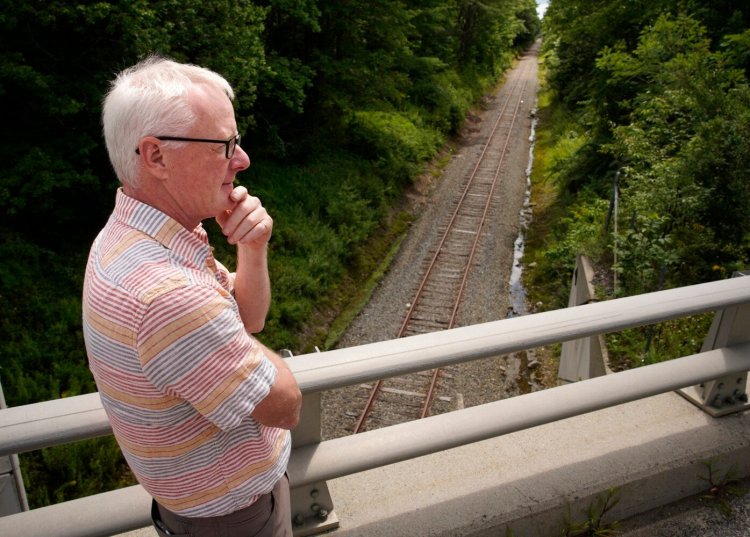Efforts to create a bike trail on a 25-mile stretch of railroad linking Portland and Auburn could again be on the back burner based on a new draft agreement between a railroad company and the Maine Department of Transportation, an advocate for the trail project said.
Richard Woodbury, a volunteer and leader with the Casco Bay Trail Alliance, said he was flabbergasted this week when he learned the state was again looking to extend an abandonment agreement it has with the St. Lawrence and Atlantic Railroad, which last ran freight on the state-owned rail line in 2015.
 The stretch of track is a key piece in a plan to link a dozen cities and towns along its route as part of a loop-like trail that would connect Portland, Lewiston and Brunswick with a bike pathway eyed by many as boon for tourism in the region.
The stretch of track is a key piece in a plan to link a dozen cities and towns along its route as part of a loop-like trail that would connect Portland, Lewiston and Brunswick with a bike pathway eyed by many as boon for tourism in the region.
Woodbury said that based on advice from the Maine DOT his organization sought resolutions from municipal governments for the project and for the state to allow a previous abandonment agreement between the state and railway operator to remain into effect, essentially allowing the bike trail to move forward.
But Transportation Commissioner Bruce Van Note said Wednesday that the department is obligated to consider all the possible uses for the line in the future and to keep the door open to freight.
“As public stewards of these rail lines, it is the responsibility of MaineDOT to fairly consider all interests, including those of advocates who hope to maintain the lines for future freight use and those who hope to instead pursue trail options,” Van Note said in a prepared statement. “Extending this agreement maintains the status quo for the time being and does not rule out the possibility of this segment of rail being transitioned to trail later on.”
But Woodbury said the move seems to be in direct conflict with advice he was given from the DOT on how to move forward with their project.
“Over the last three months, we have been to at least two dozen meetings of select boards, town councils, recreation committees, conservation committees and economic development committees, telling them that the most important consideration to whether Maine DOT would enforce the current discontinuance agreement was the views of municipalities along the corridor; because that’s what MaineDOT told us,” Woodbury said. “That they have now chosen to ignore this overwhelming expression of municipal support for enforcing the discontinuance agreement is infuriating, frankly.”
Tom Ciuba, the vice president of communications for Genessee & Wyoming Railroad Services, Inc., the parent company of St. Lawrence and Atlantic, said they are working with the state to extend the agreement.
“When the St. Lawrence and Atlantic Railroad sold the portion in question (starting at the Auburn/New Gloucester town line and traversing to Portland) to the state of Maine, the railroad retained its ability to resume freight service over the line if circumstances supported such an effort,” Ciuba said. “To date, an opportunity hasn’t materialized, but the railroad is working with Maine DOT to extend this arrangement based on potential future opportunities for rail-freight service over the corridor.”
The new agreement between the state and the railway also offers an escape clause that allows the DOT to request that the St. Lawrence and Atlantic Railroad give up its operating rights within 90 days of receiving notice from the department, which would preserve any trail options as well, said Paul Merrill, department spokesman.
Six of the seven municipalities along the line – Portland, Falmouth, Cumberland, Yarmouth, North Yarmouth and Pownal – recently passed resolutions urging the state to allow the abandonment to go forward, while another three on what would become the greater loop, including Lewiston, Lisbon and Freeport, also have formally endorsed the Casco Bay Trail Alliance Plan. Those resolutions also urged the DOT to not make any additional amendments to the agreement with the railroad without first holding a public hearing.
A law that Gov. Janet Mills signed in July and that went on the books Monday could clear the way for redevelopment of the line and others like it by setting up advisory councils that would help determine the best use of abandoned state-owned railroad tracks, including one that runs from Portland, through the Sebago Lakes region and Fryeburg and onto North Conway, New Hampshire.
The gathering of additional public input on the use of the lines is a key part of the process set up by the law and is meant to inform any request by the department for possible changes to the law that it may request from the Legislature to allow any project to move ahead, Merrill said.
“That will give all interests an opportunity for public input before any long-term strategic decision on use of this corridor is made,” Merrill wrote in a message to the Portland Press Herald. “If trail use is sanctioned, it will take many months – possibly years – to design and fund the project.”
Use of the line between Portland and Auburn, would not jeopardize any plans to extend passenger rail service between the state’s two largest metro areas, as another line that runs nearly parallel to it would be available for that purpose.
Send questions/comments to the editors.




Comments are no longer available on this story